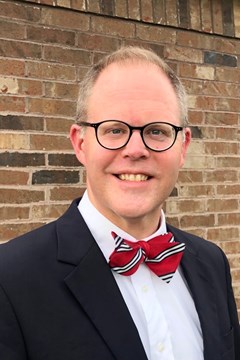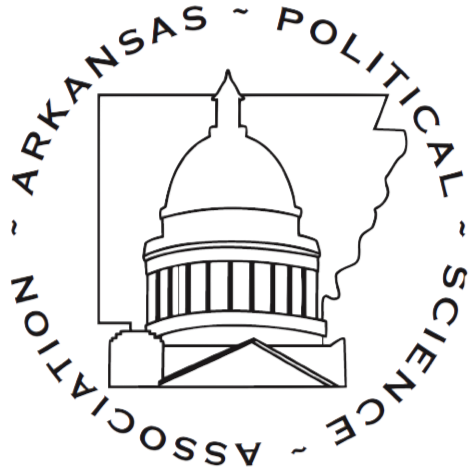After a long hiatus, we return with the eighth edition of Political Science in Arkansas, an interview series that spends time talking with important political scientists from around the state. This time we interview John C. Davis, who is executive director for the David and Barbara Pryor Center for Arkansas Oral and Visual History and teaching associate professor of political science at the University of Arkansas. From 2015 to 2022, Davis was on faculty at the University of Arkansas at Monticello where he also served as director of governmental relations. At the conclusion of 2022, Davis also completed a five-year gubernatorial appointment to the Arkansas Rural Development Commission, where he served as vice-chair.  He has authored or co-authored numerous peer-reviewed journal articles, book chapters and other publications on state politics. His book From Blue to Red: The Rise of the GOP in Arkansas about the recent historic partisan shift in Arkansas, was published by University of Arkansas Press earlier this year. Davis is a graduate of the Delta Regional Authority Delta Leadership Institute and Harvard Kennedy School of Government Authentic Leadership programs. He earned a B.A. and M.A. in political science from the U of A and a Ph.D. from the University of Missouri. An eighth generation Arkansan, Davis lives in Fayetteville with his wife, Ember; son, John Lee; and daughter, Grace.
He has authored or co-authored numerous peer-reviewed journal articles, book chapters and other publications on state politics. His book From Blue to Red: The Rise of the GOP in Arkansas about the recent historic partisan shift in Arkansas, was published by University of Arkansas Press earlier this year. Davis is a graduate of the Delta Regional Authority Delta Leadership Institute and Harvard Kennedy School of Government Authentic Leadership programs. He earned a B.A. and M.A. in political science from the U of A and a Ph.D. from the University of Missouri. An eighth generation Arkansan, Davis lives in Fayetteville with his wife, Ember; son, John Lee; and daughter, Grace.
Question: What does political science mean to you? What does the academic discipline do right; how does it go wrong?
To me, political science is the scientific study of politics, power, and governance. I think political science scholarship and teaching is at its best when it attempts to explain something in a way that can be useful to the broadest audience possible while maintaining academic rigor.
Question: Who was David Pryor and did he play in role in how you view, study, and teach politics?
David Pryor was a newspaperman, state legislator, U.S. House of Representative, governor, and U.S. Senator. I do not think we will ever see a more beloved politician in our state. After his career in elected office, Senator Pryor turned his attention to higher education and sharing his public service and political insights. David Pryor inspired my approaches to teaching and researching–particularly my interest in Arkansas politics. Senator Pryor chose a career in politics and public service because he loved people and wanted government to be a vehicle of good that served everyone. David Pryor loved stories, and I find myself using stories and real-life examples often in my teaching and research because, like David Pryor, I believe in the power of narrative to connect people and concepts.
Question: Could you tell us about what the Pryor Center does, and anything new that we might expect in 2024 or 2025? As the director, what’s your vision for the Center?
People who know me as a as a political scientist are often confused when I explain that the mission of the Pryor Center is not the study of politics or political figures, but the collection of Arkansas stories by acquiring, preserving, and sharing oral histories on people and topics related to our state. At the Pryor Center, we love stories and we are convinced that everyone has a valuable story to share that will enlighten future generations. Since I joined the Pryor Center in 2023, we have continued to collect biographical oral histories from a diverse array of Arkansans while we have also expanded our scope to projects focused on Arkansas traditions. So far, our Arkansas Traditions project has collected oral histories on the Gillett Coon Supper, the Bradley County Pink Tomato Festival, and the King Biscuit Helena Blues Festival. We will continue to collect stories from all over the state to capture more stories about the dozens of Arkansas traditions that are unique to our state. Another project we are very excited about is our KATV news archive. We have digitized thousands of hours of news coverage from KATV that will soon be available for everyone to access freely on our website: pryorcenter.uark.edu.
Question: What are some of your major findings in your book about the history of the Arkansas Republican Party? How does that build on and contrast with the rest of the literature (in terms of realignment and other debates about American political parties)?
With the book, I have attempted to chronicle the state GOP’s rise to dominance in Arkansas and argue that the GOP’s transition from out-party in a one-party state to the dominant brand it is today could be placed within three generations in the modern era, beginning in the 1960s to today. I also attempted to emphasize the importance of party organization, the role of a nationalized political environment, and the shift within the Arkansas electorate as the key contributing factors for the changes we have witness. I think the book’s findings fall in-line quite well with the literature on secular realignment, particularly in the context of Southern politics by adding Arkansas to that broader discussion. The fact is, when it comes to party politics, Arkansas is no longer all that special. Finally, I’d like to think the anecdotes and interviews presented in the book add context to the research.
Question: What makes the Arkansas Republican Party different from the party in other states?
Given that one-party states are quite common, the GOP tends to do quite well in rural southern and midwestern states, and the nationalized branding of partisan politics appears to align well with conservative voters in states within these regions, I’m not sure there is a significant difference today from the Arkansas GOP and states with similar demographics and political cultures.
Question: What future do you see for moderates (like Asa Hutchinson) and populists (like Donald Trump) within the Republican Party?
Parties change and adapt to remain relevant and competitive, so it is difficult to predict with any confidence. However, as I write this—on the eve of the 2024 elections—former president Trump is the undeniable leader and face of the Party. If he wins in 2024, I tend to think his brand of the GOP will continue to be dominant in the Party for years to come. If he loses, there will likely be a heated and ongoing debate for the direction of the Party that could lead to a re-emergence of Regan/Bush era conservative messaging that, as of late, has been somewhat pushed aside within the GOP.
Question: Do you see the Democratic Party playing a more competitive role in elections, at any level, in the future? What would make the Democrats more competitive in the state?
While I think the Democratic Party in Arkansas has a long way to go, I see them doing the things a party out of power must do to regain relevance–recruiting candidates, training volunteers and campaign staff, messaging, etc. Like the GOP in Arkansas in the 1980s, Democrats today must find folks who are willing to file to run for offices knowing they are automatically the underdog–particularly in contests with a Republican incumbent. That said, we are in a very polarized and nationalized party environment right now where the progressive messages of the Democratic Party do not seem to align well with a significant portion of Arkansas voters–complicating matters for Democrats attempting to regain some ground in a center-right state. Currently, the state’s political climate makes it very difficult to see a statewide victory for Democrats soon, but I think we could see some state legislative races be very competitive or even flip in the next few cycles–especially in Northwest Arkansas. Again, it will be a long road, but the population growth in the NWA region creates opportunities for Democrats to rebuild.
Question: What does the future hold for political parties as an institution in American politics?
Americans love to hate political parties. This sentiment seems to be growing even though we are exhibiting stronger partisanship (declining split-ticket voting, negative partisanship, polarization, etc.). Approximately, one-third of adults identify as “independent” but most of those lean to one party or another. Given this, I don’t see a dramatic change in the way parties shape and facilitate our politics and governmental institutions anytime soon.
Question: Arkansas has terrible civic engagement and voter turnout, according to the Arkansas Civic Health Index. Do you see that borne out in your students and in the communities that you are engaging with as Pryor Director?
Our abysmal civic engagement concerns me greatly and is one of the most pressing problems in our state. However, I continue to be inspired by my students’ optimism and desire for a politics that is more civil, equitable, and policy driven.
Question: As someone who teaches American politics, how do you address student apathy, ignorance, and hyper-partisanship in the classroom?
I am sure we all have methods that serve us well on these issues, but I have found that–regarding partisanship and the potential for the learning environment to become fraught with incivility–if I set a tone for how I want everyone in my classroom to engage with the material, with me, and each other, these issues occur less frequently. While I cannot automatically eliminate apathy someone might have for a subject, I can communicate my passion for the material and, sometimes, that interest I am expressing can be contagious.
Question: As someone who teaches introductory class with a range of student abilities, interests, and knowledge, how do you keep students engaged and interested in American Politics?
Introduction to American National Government is the most important class I teach. I regularly tell my students in that class that I have 16 weeks to help them become more complete citizens of their town, state, nation, and world. The stakes are high! In addition to attempting to make the information in the course interesting and engaging, I try very hard to build rapport with my students, be as approachable and accessible as I can, and–when possible–meet them where they are.
Question: Could you tell us about your usage of Open Educational Resources (OER) in your classes? How did you decide to use OER? What OER do you use in your classes? What impact do they have on your students? What challenges does their usage present to faculty?
I was inspired to use Open Education Resources by a friend of mine named who is professor criminal justice at the University of Arkansas at Monticello, Dr. Adam McKee. I predominantly use OER in my introductory classes. Over the years, I have adopted OER textbooks and adapted other materials to help my students save money. I have yet to author an OER textbook of my own, but greatly appreciate the effort people put in to these projects. The most recent OER textbook I have assigned was the 3rd edition of American Government. Adam and I have surveyed students and found they appreciated the cost savings, ease of having a book pre-loaded into the course LMS, and had no reservations regarding the quality of the free textbook. Overall, I would encourage teachers to consider using OER, when practical.
